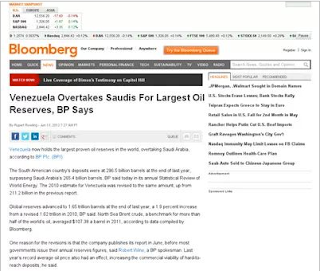Bloomberg’s headline falsely attributes
claims to BP.
London 14.06.2012, 01:23 GMT | A lie is halfway round the world before the truth has got its boots on. This particular lie started with Bloomberg, which published today a piece entitled «Venezuela Overtakes Saudis For Largest Oil Reserves, BP says»
After visiting BP pages (press release and corresponding report), I took the bother to send an email to Rupert Rowling and Stephen Voss at Bloomberg this afternoon, for, knowing how totally unbelievable such a headline is, I had to read for myself what BP had actually said. Here’s what me, Bloomberg’s mediocre journalists / editors, and anyone else with an interest in the topic can read in BP’s website, as per the source of figures cited:
Venezuelan Orinoco Belt reserves are based on the OPEC Secretariat and government announcements.
BP is clear, both in the press release and corresponding reports, that reserves figures are sourced from OPEC Secretariat -which gathers information from its members, Venezuela being one of them- and from Venezuelan government announcements. Chavez may be dying, but he is not mentally impaired just as yet. So of course, he is going to carry on blowing his own trumpet, saying that Orinoco Belt oil reserves are the largest in the world. However, has any independent party, from anywhere, checked the validity of Chavez’s claim?
Not long ago, his regime was also saying that Venezuela had eradicated illiteracy. They threw UNESCO in for good measure, just as Bloomberg has done with BP. However, all it takes to put paid to that claim is a trip to any Caracas barrio, yet the MSM had a field day repeating the BS about Venezuela being an «illiteracy free» country. And all it took me to debunk Bloomberg’s impossible claim was one Google search, but by then the lie was half around the world.
Needless to say that Bloomberg did not acknowledge my email, nor did it reply to it. But it did change its utterly misleading headline -without publishing a clarifying note, getting rid of the «BP says» part.
Now, I am no journalist, nor do I claim to be one. But I do ponder about the reasons of using such complete fabrications by outlets like Bloomberg. If the original headline is to be taken at face value, my question to Bloomberg is: since when is BP an authoritative source in determining whether one OPEC country’s oil reserves have surpassed those of another OPEC country?
And if Bloomberg has realised the sheer preposterousness of its original headline, now that it has edited the BP bit out, who is claiming that Venezuelan reserves have surpassed those of Saudi Arabia? I’ll tell you who, which is what BP actually said: Hugo Chavez and his regime officials.
In other news, Raul Castro said that Cuba complies fully with international treaties on human rights…
Update: Bloomberg’s Rupert Rowling did reply to my email this morning (08:15:05 GMT). What follows is our exchange, as of time of this posting:
Subject: Re Venezuela Overtakes Saudis For Largest Oil Reserves, BP Says
From: [email protected]
To: RUPERT ROWLING (BLOOMBERG/ NEWSROOM:)
Cc: STEVE VOSS (BLOOMBERG/ NEWSROOM:)
At: 6/13 18:39:29
Dear Sirs,
Further to your misleading title, please note in http://www.bp.com/sectiongenericarticle800.do?categoryId=9037157&contentId=7068604
Sources
The estimates have been compiled using a combination of primary official sources, third-party data from the OPEC Secretariat, World Oil, Oil & Oil & Gas Journal and an independent estimate of Russian and Chinese reserves based on information in the public domain. Canadian oil sands ‘under active development’ are an official estimate. Venezuelan Orinoco Belt reserves are based on the OPEC Secretariat and government announcements.
Therefore, it is not BP saying that Venezuela overtakes Saudis, but OPEC Secretariat (figures from Venezuelan government) and Venezuelan government own announcements. Have you bother asking yourselves whether those figures have been independently corroborated?
Cordially,
A Boyd
On 14 Jun 2012, at 08:15, RUPERT ROWLING (BLOOMBERG/ NEWSROOM:) wrote:
Dear Mr. Boyd,
Thanks for your email. At the bottom of the article you will have noticed the following paragraph.
BP said the estimates in yesterday’s report are a combination of official sources, OPEC data and other third-party estimates. Deposits include gas condensates and natural-gas liquids, as well as crude.
We are aware the data is from a collection of sources but as it was published yesterday in BP’s Statistical Review, that is why it appeared with the headline «… BP Says».
Kind regards,
Rupert
From: Alek Boyd <[email protected]>
Date: 14 June 2012 10:37:13 GMT+01:00
To: «RUPERT ROWLING (BLOOMBERG/ NEWSROOM:)» <[email protected]>
Subject: Re: Re Venezuela Overtakes Saudis For Largest Oil Reserves,
Dear Rupert,
Thanks for your reply.
I did notice at first the paragraph you’re referring to, though I still think that your choice of headline is totally misleading.
A more appropriate one, reflecting the contents of BP press release and report, would have been «… OPEC says» which gets its numbers from Venezuela, or «… BP says citing OPEC / Venezuela sources», or even «… Venezuela / Chavez says».
All of those would have negated the veracity and validity of the first part of what you claim with your headline, for none lends credence to it. Hence my email.
I take that you have been reporting oil markets for a while, it wouldn’t be a stretch for me to assume that you know as well as any other seasoned oil reporter / analyst that Venezuela / Chavez’s claims about oil hold no water. None whatsoever. Complete fabrications with no basis in verifiable data.
So why would Bloomberg / you echo Chavez’s claims? Claims which -need be stressed- no independent party has corroborated?
With best wishes,
Alek Boyd
Tomado de [Update] Bloomberg misleads about Venezuela oil reserves
